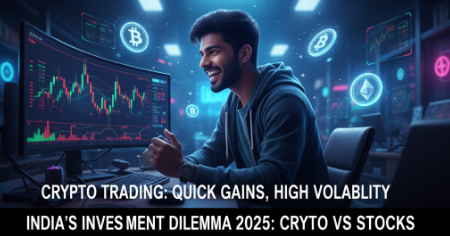In 2025, both cryptocurrency trading and stock market trading attract huge interest among Indian investors. Crypto appeals to those seeking quick profits, while stock trading continues to dominate as a structured and regulated investment. Understanding the core differences between the two markets is crucial before deciding which trading path provides long-term growth and safety.

The foundation of any financial market lies in its regulation. Cryptocurrency trading operates largely in a decentralized world, with very limited formal oversight. This opens doors for innovation but also for scams and unregulated risks. Stock trading, by contrast, is heavily regulated by SEBI in India, creating a safer environment for retail and professional traders alike.
Table 1: Market Regulation Comparison
| Factor | Crypto Trading | Stock Trading |
|---|---|---|
| Regulatory Body | Mostly unregulated globally | SEBI (India), SEC (US), others |
| Legal Framework | Varies by country, uncertain | Established and enforced laws |
| Investor Safety | High fraud/scam risk | Strong investor protection |
| Dispute Resolution | Minimal or none | Formal mechanisms (SEBI/SAT) |
Cryptocurrency is known for its extreme price swings. A coin’s value can rise or fall by 20–30% within a single day. This volatility makes crypto attractive to speculators but dangerous for stability-seeking investors. Stocks, while also subject to fluctuations, move within regulated boundaries. Circuit breakers and risk management rules reduce panic and protect investors from massive overnight losses.
Table 2: Volatility Comparison
| Factor | Crypto Trading | Stock Trading |
|---|---|---|
| Price Fluctuation | Extremely high (20–30% daily possible) | Moderate (1–5% daily typical) |
| Circuit Breakers | None | Yes, SEBI-imposed limits |
| Risk Level | Extremely high | Controlled and managed |
| Suitability | Speculative traders | Short-term & long-term investors |
Crypto markets trade 24/7 across the globe. While this appears convenient, it can overwhelm traders with no clear rest period. Stock markets in India operate only during fixed hours, allowing structured trading and healthy balance. Moreover, stock trading requires verified KYC and broker accounts, whereas many crypto exchanges lack proper verification, adding to investor risk.
Table 3: Liquidity & Accessibility
| Factor | Crypto Trading | Stock Trading |
|---|---|---|
| Market Hours | 24/7, no breaks | 9:15 AM – 3:30 PM (India) |
| Accessibility | Global, less verification | Verified brokers, KYC required |
| Liquidity | Varies by coin/exchange | Highly liquid for most stocks |
| Control | Decentralized | Regulated and structured |
For learners, career scope matters as much as trading profits. Crypto trading lacks recognized certifications and formal institutions, limiting career pathways. Stock trading, however, is supported by certifications like NISM and NCFM, and institutes provide structured programs. Stock trading also leads to opportunities in investment banking, portfolio management, and research — areas not available in crypto.
Table 4: Career and Learning Opportunities
| Factor | Crypto Trading | Stock Trading |
|---|---|---|
| Certifications | None officially recognized | NISM, NCFM, NSE certifications |
| Institutes | Very limited | Trading academies, universities, SEBI links |
| Job Roles | Limited, exchange-specific | Analyst, portfolio manager, broker, trader |
| Long-Term Career | Unstable | Strong and recognized |
Stock trading provides a stable, regulated, and globally recognized investment platform. With clear laws, certifications, and structured opportunities, it offers both career growth and financial safety. Cryptocurrency, while innovative, still lacks regulation and carries excessive volatility. For Indian investors in 2025, stock trading remains the smarter, more sustainable path to financial success.
When it comes to learning stock trading, Trading Shastra Academy in Noida leads the way. Founded by Himanshu Gurha, the academy specializes in Options Hedging, Arbitrage, and Adaptive Trading Strategies. Students receive funded capital, risk coverage, stipend internships, and two verified certificates. With its unique mythological teaching approach, Trading Shastra blends practical skills with memorable learning.
Trading Shastra Academy Programs
| Program | Fees | Capital Support | Duration | Stipend |
|---|---|---|---|---|
| Supreme Trader Program B | ₹1,04,000 | Yes | 3 Months | ₹5,500 |
| Supreme Trader Program A | ₹2,30,000 | Yes | 5 Months | ₹11,000 |
| Ultra Supreme Trader Program | ₹3,20,000 | Yes | 5 Months | ₹15,000 |
Crypto trading may offer speculative excitement, but it lacks stability, regulation, and career growth. Stock trading, on the other hand, combines transparency, regulation, and verified learning opportunities. With institutions like Trading Shastra Academy providing funded capital, mentorship, and certifications, stock trading clearly stands as the best option for Indian learners and investors in 2025.
📍 Trading Shastra Academy, B-11, Sector 2, Noida – 201301
🌐 www.tradingshastra.com | 📧 info@tradingshastra.com | 📱 +91 9717333901
⚠️ Disclaimer: This blog is for educational purposes only. Stock market investments are subject to risks. Please do thorough research before investing.
Yes. Stock trading is safer, regulated, and offers verified certifications with clear career opportunities. Trading Shastra Academy makes it practical by providing funded capital, mentorship, and loss protection.
Trading Shastra Academy provides funded capital, 100% risk management coverage, stipend internships, and dual certifications. This combination ensures both learning and practical exposure in live markets.
Yes. Beginners can join easily as the programs are step-by-step, covering basics, strategies, and live trading. With mentorship and safe capital, beginners gain confidence without fear of financial loss.
On completion, every student receives two verified certifications. These certifications build credibility, add professional weight to resumes, and open doors to finance and trading-related career opportunities.
All programs include full risk management coverage. Students trade with institute-provided capital, and any trading losses are covered by the academy, ensuring a stress-free learning environment.
Weekly Webinar, Every Saturday • 7:00 PM (IST)

Founder & CEO, Trading Shastra Academy
12+ Years • ₹10 Cr Funds Managed
95k+ Instagram • 11k+ YouTube
This webinar is for educational purposes only. Stock market investments are subject to Market risks.